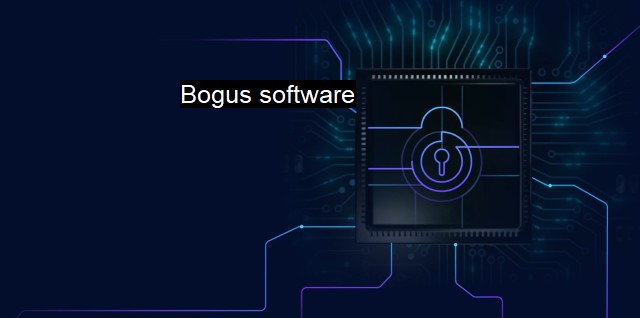What is Bogus software?
The Dangers and Deceptions of Bogus Software: How Fraudulent Programs Threaten Cybersecurity and Mislead Users
Bogus software, often referred to as rogue software, rogue security software, or "scareware," is a form of malicious software. This type of software tricks victims into believing their computer is severely infected with viruses, worms, or other forms of malware. The goal of this deceit is to manipulate the user into buying unnecessary and often non-functional remedy software.Bogus software is well-disguised and often appears legitimate to the untrained eye. It may present as an anti-virus software, claiming to protect your PC from malware. their final intent is not to safeguard your computer but instead to exploit your vulnerabilities. The creators of bogus software manufacture artificial circumstances to dupe potential victims—these scam artists usually have a basic understanding of cybersecurity and antivirus protocols, allowing them to convincingly mimic authentic software performance reviews and analysis.
Operationally, bogus software uses a range of tactics to pressurize and deceive the user into purchasing their product. It usually begins with unsolicited pop-up advertisements appearing on the user's computer, claiming the computer is at high risk and riddled with infections. it may modify the system settings resulting in exaggerated error messages or unusual system behaviors. All this is a ploy created to intimidate the user into hastily buying the supposed cure to these exaggerated or even non-existent problems.
These fear tactics work because the average user is often unsure how to interpret the computer’s health indications, and the severity of cyber threats is widely understood. This fear forms the ideal breeding ground for bogus software scams. it doesn't help that scareware tends to pop up at the most inconvenient times – whether you're in the middle of a project, an online meeting, or on edge about a potential virus threat.
The potential impact of installing bogus software goes far beyond monetary losses from purchasing worthless software. After gaining your trust, some bogus software can release an actual virus or worm in your system, compromising your cybersecurity. This puts you at risk of identity theft, loss of sensitive data, and unwanted sharing of personal information.
As a countermeasure for bogus software, installing a genuine antivirus system is recommended. But this must be supplemented by awareness and caution when faced with disease threats. Users should be skeptical of unsolicited security warnings. It's advisable to manually run your antivirus software if warnings surface, rather than clicking on links purporting to do it for you. Following credible technology blogs and cybersecurity portals can keep you updated about the latest threats, providing you with the knowledge of what to watch out for.
Risky web browsing behavior should be avoided. You should only download software from trusted sources and refrain from clicking on dubious links or pop-up prompts. Regularly updating your software can protect against many kinds of attacks. Most importantly, back up your crucial data regularly—should an attack happen regardless of precautionary measures, you'll feel less panicked knowing your important data is safe.
In this increasingly interconnected world, the danger of becoming a target of bogus software attacks grows by the day. It is crucial to maintain an up-to-date mindset and toolkit for guarding against such threats. Improved awareness, coupled with access to credible cybersecurity infrastructure and cautious practices, can substantially mitigate the dangers that bogus software poses. It's hasty actions, driven by panic, that give bogus software the free reign. Staying calm, alert, and informed is your best defense.

Bogus software FAQs
What is bogus software?
Bogus software refers to malicious or fake software that is designed to deceive users into believing that it is legitimate software. It is often used as a tool for cybercriminals to gain access to a user's computer or personal information.What are the most common types of bogus software?
The most common types of bogus software include fake antivirus software, misleading pop-up ads, bogus tech support scams, and pirated software or keygens.How can I protect myself from bogus software?
You can protect yourself from bogus software by only downloading software from reputable sources, keeping your antivirus software up-to-date, being cautious of pop-up ads and suspicious emails, and avoiding pirated software or keygens.What should I do if I suspect that I have downloaded bogus software?
If you suspect that you have downloaded bogus software, you should immediately run a virus scan, uninstall the software, and change any passwords or login information that may have been compromised. It is also important to report any fraudulent activity to the appropriate authorities.| | A | | | B | | | C | | | D | | | E | | | F | | | G | | | H | | | I | | | J | | | K | | | L | | | M | |
| | N | | | O | | | P | | | Q | | | R | | | S | | | T | | | U | | | V | | | W | | | X | | | Y | | | Z | |
| | 1 | | | 2 | | | 3 | | | 4 | | | 7 | | | 8 | | |||||||